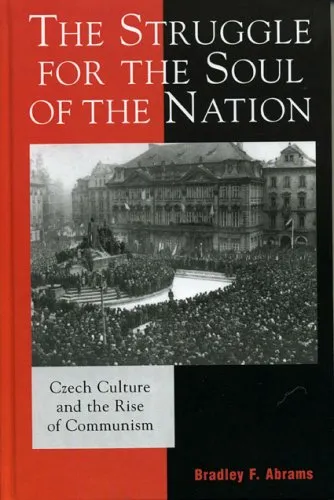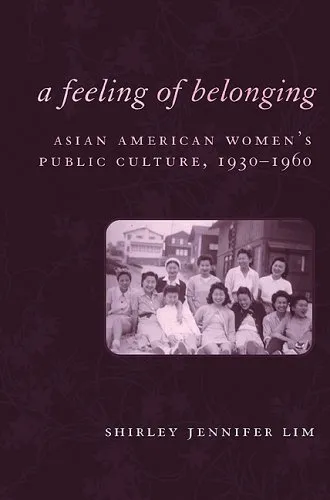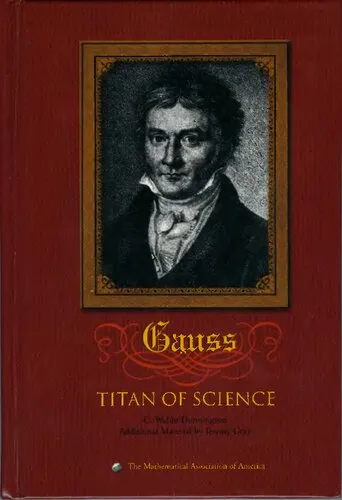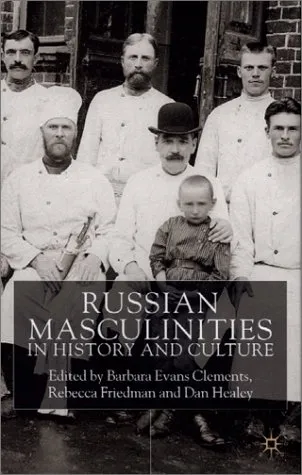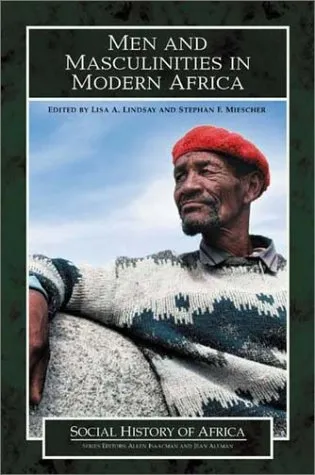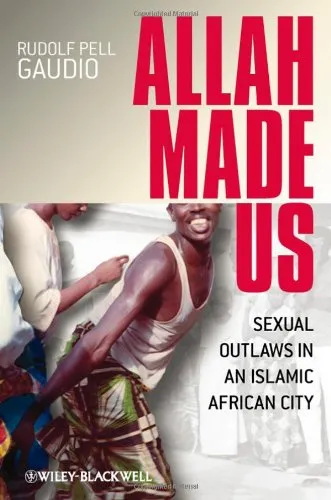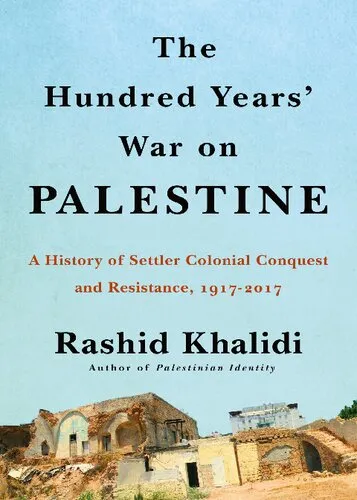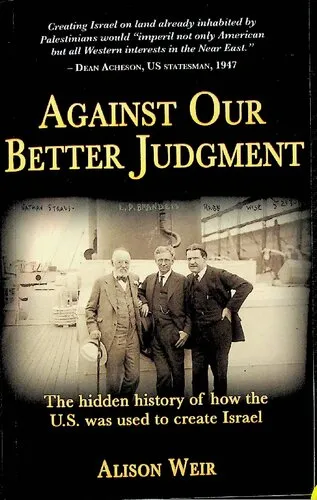The Struggle for the Soul of the Nation: Czech Culture and the Rise of Communism
4.0
بر اساس نظر کاربران

شما میتونید سوالاتتون در باره کتاب رو از هوش مصنوعیش بعد از ورود بپرسید
هر دانلود یا پرسش از هوش مصنوعی 2 امتیاز لازم دارد، برای بدست آوردن امتیاز رایگان، به صفحه ی راهنمای امتیازات سر بزنید و یک سری کار ارزشمند انجام بدینRelated Refrences:
معرفی جامع کتاب "The Struggle for the Soul of the Nation: Czech Culture and the Rise of Communism"
کتاب "The Struggle for the Soul of the Nation: Czech Culture and the Rise of Communism" اثر Bradley F. Abrams، یکی از عمیقترین و تأثیرگذارترین آثار تاریخ فرهنگی در زمینه بررسی چگونگی تلاقی فرهنگ، سیاست و ایدئولوژی در جمهوری چک است. این کتاب با تأکید بر دوران تاریخی پس از جنگ جهانی دوم و نقش فرهنگ در تحول سیاسی، بررسی میکند چگونه نظام کمونیستی توانست در کشوری با سنتهای قوی دموکراتیک ریشهدار پیروز شود.
خلاصهای جامع از کتاب
این کتاب به طور گسترده موضوعات مختلفی را پوشش میدهد، از جمله چگونگی تأثیرگذاری جنگ جهانی دوم بر مفاهیم ملیگرایی، هویت فرهنگی و ایدئولوژی سیاسی در جمهوری چک. Bradley F. Abrams تحلیل میکند که چگونه نویسندگان، هنرمندان و روشنفکران نقش کلیدی در تعریف و بازتعریف هویت ملی ایفا کردند، در حالی که تلاش کردند فرهنگ را به عنوان نیرویی برای مقاومت در برابر فشارهای خارجی و ایدئولوژیهای تحمیلی، مانند Communism، به کار ببرند. او تأکید میکند که فرهنگ در این دوره تاریخی هم ابزاری برای اعتراض بود و هم وسیلهای برای سازش. همچنین، این اثر نشان میدهد که چگونه ایدهها و تفکرات فرهنگی دستمایهای برای تثبیت نظام کمونیستی و گسترش پروپاگاندا شدند.
این کتاب به جزئیات تاریخی و سیاسی وقایع نیز میپردازد و با تحلیل عمیق نشان میدهد که چگونه ظهور نظام کمونیستی در چکسلواکی اتفاق افتاد و شیوهای که فرهنگ بر این فرآیند تأثیر داشت. Bradley F. Abrams در این میان، از منابع آرشیوی گسترده، نامهها، ادبیات و هنر، و سایر شواهد تاریخی استفاده کرده و تصویری جامع و چندجانبه از این دوره حساس ارائه میدهد.
نکات کلیدی از کتاب
- تحلیل دقیق از نقش نویسندگان و روشنفکران در شکلدهی و تقویت هویت فرهنگی در دوره پس از جنگ.
- بررسی دقیق تعامل میان فرهنگ و سیاست در کشوری که بهطور پیوسته تحت فشارهای خارجی قرار داشت.
- درک بهتر از چگونگی بهرهبرداری کمونیسم از فرهنگ و ایدئولوژی برای گسترش نفوذ و قدرت خود.
- افشای تناقضات میان مقاومت فرهنگی و پذیرش فرهنگی در برابر Communism.
- نشان دادن روند گسترش پروپاگاندا در ادبیات، رسانه و هنر مدرن چکسلواکی در قرن بیستم.
جملات برگزیده از کتاب
"Culture is never isolated from politics, even when it tries to remain so."
"The battle for the soul of the nation is waged not just in parliaments, but on the pages of books, on theater stages, and in the hearts of everyday citizens."
"Communism conquered not just by force, but by entering the bloodstream of national culture."
چرا این کتاب مهم است
کتاب "The Struggle for the Soul of the Nation" به دلیل پرداختن به موضوعی بسیار مهم و دیالوگ بین فرهنگ و سیاست از اهمیت ویژهای برخوردار است. در دنیایی که فرهنگ و رسانه نقش کلیدی در شکلدهی به سیاست دارند، این کتاب درسی جاودانه برای همگان است. این اثر نه تنها برای افرادی که به تاریخ اروپا و Communism علاقهمند هستند، بلکه برای علاقهمندان به بررسی رابطه میان فرهنگ و قدرت اجتماعی نیز اثری حیاتی و ضروری است.
آثار Bradley F. Abrams در این کتاب به طور خاص به افرادی کمک میکند که به دنبال درک عمیقتر از تاریخ، سیاست و نقش فرهنگ در تعامل با تغییرات سیاسی و اجتماعی هستند. بدین ترتیب، این اثر میتواند به عنوان راهنمایی ارزشمند برای تحلیلگران سیاسی، پژوهشگران فرهنگی و حتی عموم مردم مورد استفاده قرار گیرد.
Introduction to "The Struggle for the Soul of the Nation: Czech Culture and the Rise of Communism"
"The Struggle for the Soul of the Nation: Czech Culture and the Rise of Communism," written by Bradley F. Abrams, delves into one of the most transformative and tumultuous periods in 20th-century Czech history. This thought-provoking work explores the intricate interplay between culture, politics, and ideology, shedding light on the rise of communism in Czechoslovakia after World War II. By carefully analyzing the cultural and intellectual response to political upheaval, the book provides a profound understanding of how Czech identity was refashioned during a time of immense ideological conflict.
Unlike conventional historical approaches that focus solely on institutional dynamics or leadership decisions, Abrams emphasizes the pivotal role of intellectuals, writers, and cultural elites. He illustrates how their ideas, artistic expressions, and public discourses shaped—and were shaped by—the intense struggle to define the nation’s soul. At its core, the book interrogates how Czech culture grappled with questions of national identity, modernity, democracy, and socialism, navigating a precarious path through the complex realities of the postwar world.
With its nuanced research, Abrams's work is both academically rigorous and highly accessible, making it a valuable resource for historians, political scientists, and anyone interested in understanding the relationship between culture and ideology in shaping societal transformations.
Detailed Summary of the Book
The book begins by situating the reader in post-World War II Czechoslovakia, a nation emerging from the ashes of Nazi occupation and confronting the challenges of rebuilding its social and political fabric. Abrams explores the motivations and strategies of the Communist Party of Czechoslovakia (CPC) in consolidating power, emphasizing that their success was not merely a result of coercion or Soviet influence. Instead, he argues that the Communists achieved dominance by weaving their ideology into the cultural and intellectual frameworks of the time.
A crucial portion of the book focuses on how Czech intellectuals—many of whom were initially sympathetic to socialism—played a key role in legitimizing the Communist project. Abrams examines their debates on democracy, socialism, and cultural identity, revealing how these discussions were co-opted by the Communist Party to align with their ideological goals. Through close readings of literary works, political speeches, and artistic productions, Abrams demonstrates how culture was weaponized to serve political ends.
The narrative also highlights the tension between competing visions of national identity. At the heart of this conflict was a struggle between individual freedom and collective responsibility, tradition and modernity, as well as the Western democratic model and the Soviet-inspired socialist model. Abrams argues that the choices made during this period set in motion a reconfiguration of Czech culture that had profound and lasting ramifications.
Key Takeaways
- The rise of communism in Czechoslovakia cannot be fully understood without considering the cultural and intellectual climate of the time.
- Czech intellectuals, artists, and cultural elites played a central role in the ideological battles that shaped the nation’s trajectory.
- Communism in Czechoslovakia was not imposed purely through external force or repression, but also through ideological engagement and cultural adaptation.
- The ideological struggle had far-reaching implications for questions of national identity, individual agency, and cultural expression.
- Abrams’s examination underscores the interconnectedness of politics, culture, and ideology in shaping historical transformations.
Famous Quotes from the Book
"It was not brute force alone that won the day for communism in Czechoslovakia; it was the artful melding of ideology with culture, of the written word with political endeavor, and of dreams with realities."
"Culture is history's most subtle battleground, where victories may be won without the firing of a single shot, but with consequences no less profound."
"The intellectuals of postwar Czechoslovakia occupied a precarious space, torn between personal convictions, public responsibilities, and the ever-tightening grip of the Communist regime."
Why This Book Matters
"The Struggle for the Soul of the Nation" is an essential read for anyone seeking to understand the dynamics of cultural power in shaping political ideologies. By focusing on Czechoslovakia's unique historical experience, Abrams offers insights that resonate far beyond its borders, touching on universal themes of freedom, identity, and the role of culture in contentious times.
The book matters because it challenges simplistic narratives about political change, demonstrating that ideology is not imposed in a vacuum. Instead, Abrams unveils the deeply embedded cultural flows that influence and are, in turn, influenced by political discourse. In an era where questions of national identity and ideological struggle remain relevant worldwide, Abrams’s work serves as a timely reminder of the complexities and subtleties involved in such transformations.
دانلود رایگان مستقیم
شما میتونید سوالاتتون در باره کتاب رو از هوش مصنوعیش بعد از ورود بپرسید
دسترسی به کتابها از طریق پلتفرمهای قانونی و کتابخانههای عمومی نه تنها از حقوق نویسندگان و ناشران حمایت میکند، بلکه به پایداری فرهنگ کتابخوانی نیز کمک میرساند. پیش از دانلود، لحظهای به بررسی این گزینهها فکر کنید.
این کتاب رو در پلتفرم های دیگه ببینید
WorldCat به شما کمک میکنه تا کتاب ها رو در کتابخانه های سراسر دنیا پیدا کنید
امتیازها، نظرات تخصصی و صحبت ها درباره کتاب را در Goodreads ببینید
کتابهای کمیاب یا دست دوم را در AbeBooks پیدا کنید و بخرید
1283
بازدید4.0
امتیاز0
نظر98%
رضایتنظرات:
4.0
بر اساس 0 نظر کاربران
Questions & Answers
Ask questions about this book or help others by answering
No questions yet. Be the first to ask!
